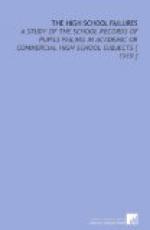pupils who remain in school one or two semesters or
less, but take no examinations and receive no semester
grades, might reasonably be considered to have failed
if they shunned examinations merely to escape the recording
of failures, as sometimes appears to be the case when
judged from the incomplete grades recorded for only
a part of the semester. A few pupils will elect
to ‘skip’ the regular term examination,
and then repeat the work of that semester, but no
failures are recorded in such instances. Some
teachers, when recording for their own subjects, prefer
to indicate a failure by a dash mark or by a blank
space until after the subject is satisfied later,
and the passing mark is then filled in. One school
indicates failure entirely by a short dash in the space
provided, and then at times there occurs the ‘cond’
(conditioned) in pencil, apparently to avoid the classification
as a failure by the usual sign. One finds some
instances of a ‘?’ or an ‘inc’
(incomplete) as a substitute for a mark of failure.
Again, where there is no indication of failure recorded,
the dates accompanying the grades for the subjects
may tell the tale that two semesters were required
to complete one semester’s work in a subject.
Some of these situations were easily discernible,
and the indisputable failures treated as such in the
succeeding tabulations; but in many instances this
was not possible, and partial statement of these cases
is all that is attempted.
How far these selected schools, their pupils, and
the facts relating to them are representative or typical
of the schools, the pupils, and the same facts for
the states of New Jersey and New York, cannot be definitely
known from the information that is now available.
It seems indisputable, however, that the schools concerned
in this study are at least among the better schools
of these two states. If we may feel assured that
the 6,141 pupils here included are fairly and generally
representative of the facts for the eight schools to
which they belong and which had an enrollment of 14,620
pupils in 1916; and if we are justified in classing
these schools as averaging above the median rank of
the schools for these states, then the statistical
facts presented in the following pages may seem to
be a rather moderate statement regarding the failures
of high school pupils for the states referred to.
It must be noted in this connection, however, that
it is not unlikely that such schools, with their adequate
records, will have the facts concerning failure more
certainly recorded than will those whose records are
incomplete, neglected, or poorly systematized.




